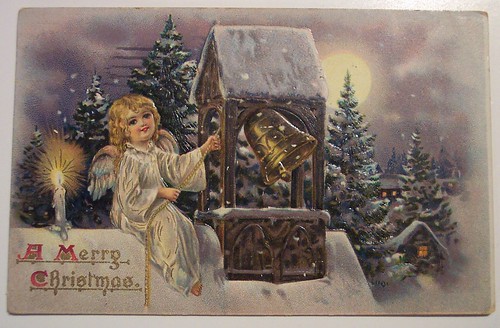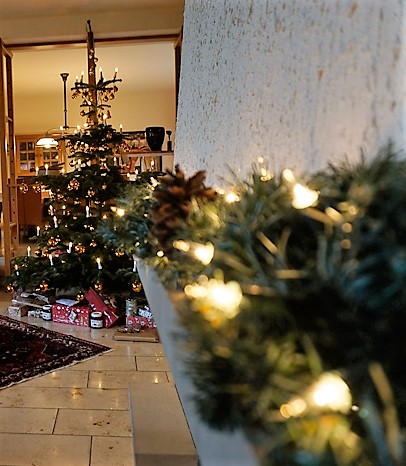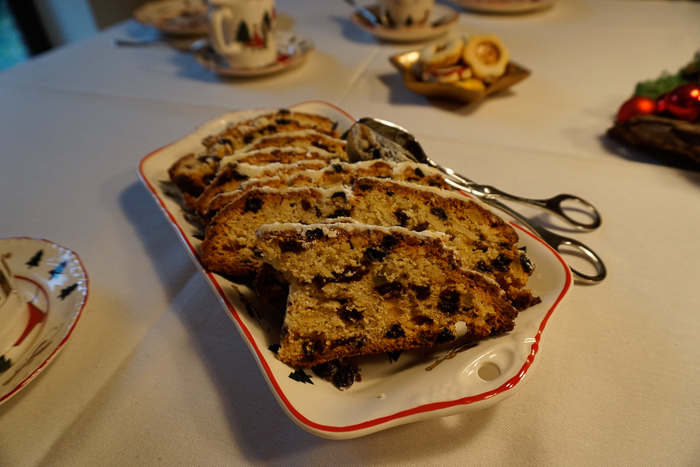Heiligabend – Christmas Eve in Germany Posted by Sten on Dec 25, 2017 in Culture, Food, Language, Traditions
It is Christmas morning! Frohe Weihnachten (Merry Christmas)! Today is the day that Jesus Christ was born. And it means waking up to presents, because Santa was there, too! But not so in Germany. Kids and adults wake up on December 25 without presents to unwrap. Do they not receive and give presents during Christmas? Oh, they do. So what is going on?
Well, in Germany, it is on the Heiliger Abend (literally “Holy Evening”, Christmas Eve), or more commonly, Heiligabend or Weihnachtsabend, that Geschenke (presents) are ausgepackt (unwrapped). So on December 24, not December 25!
Sometimes, when the Kinder (children) are not old enough yet, the Bescherung – the handing out of the presents – takes place in the afternoon. However, before that, some Kaffee und Kuchen (coffee and cake) are had. That is quite common throughout the year in Germany, a sort of afternoon tea. However, there are special cakes and cookies during Weihnachten. My Mutter (mother) always makes these amazing Weihnachtsplätzchen (Christmas cookies). And a Stollen (Christmas stollen) must be there, of course. Sometimes, the Kaffee is also exchanged for Glühwein (mulled wine). After these Köstlichkeiten (delicacies), the Auspacken (unwrapping) begins.
However, when the children are old enough, all the Auspacken happens right after an excellent Weihnachtsessen (Christmas Dinner). Together with some more Glühwein or some Bier (beer) – a German staple you just cannot go around -, it is an evening on which families in Germany come together and celebrate being together, giving each other presents. For this reason, it is the Lieblingszeit (favorite time) of the year for many people.
Presents are placed underneath the Weihnachtsbaum (Christmas tree) in the Morgen (morning) or Nachmittag (afternoon) of the 24th. Of course, if there are Kinder, they are not supposed to see that it was not the Weihnachtsmann or the Christkind. The what?
Das Christkind

Vintage German postcard with the Christkind (Image by vintagehalloweencollector on Flickr.com under license CC BY ND 2.0)
In some regions of Germany, it is not the Weihnachtsmann (literally “Christmas Man”, Santa Claus) that brings the Geschenke, but the Christkind (literally “Christ Child”). It is a figure brought by Martin Luther to eliminate Saint Nicholas, so that people stop commemorating him. The procedure is quite similar to how it goes with the Weihnachtsmann. The Kinder (Children) are not allowed to go look for the Christkind, or it won’t come! So kids, just sit still and let the Christkind do its thing!
Weihnachten
And today, it is Weihnachten, though because of all the festivities on the day before, many people already see Heiligabend as Christmas. The presents are unwrapped, and many people go to church. All shops are closed, because it is erster Weihnachtstag (First Christmas Day). First? There is a second?
Yes, because on the zweite Weihnachtstag (Second Christmas Day), Saint Stephen is commemorated. It is an official holiday in many countries, including Germany.
On both these days, many people visit friends and other family to give them Geschenke, or to have some food together or some more Kaffee und Kuchen. Both days are official holidays, so mostly, it is just a day of relaxing!
For a whole list of Christmas-related vocabulary, check out this excellent post by Larissa!
What do you celebrate at the end of December? If you celebrate Christmas, how do you do it? Let me know in the comments below!

Build vocabulary, practice pronunciation, and more with Transparent Language Online. Available anytime, anywhere, on any device.







Comments:
Alcazar:
Nice post and its quite common here in Germany that the children have to say a Weihnachtsgedicht or sing a Weihnachtslied before unwrapping their gifts.
Did you too as a child? 😉
Sten:
@Alcazar Oh that is cool! Nope, I am not familiar with that tradition. With St Nicholas, we would make poems for the people we gave presents to, though. That is rather a Dutch tradition, though. Read about that here.
Allan Mahnke:
Thanks! You take me back to my childhood. Our customs were much as you describe them. At that time many people of German heritage went to church again on Second Christmas Day, but I don’t know of any communities in the US where this is still practiced. Your goodies look much like the ones I recall. We still hope to make a batch of Zimtsterne in the next week.
We have, however, adapted our Christmas Stollen to our own tastes. We kept the raisins from my grandmother’s recipe but banished the candied fruit, replacing it with dried cherries. We also follow the tradition of filling the Stollen with a bit of Marzipan, but with a twist: We add a bit of chocolate ganache. There aren’t many combinations better than Marzipan & chocolate! It may be a little unorthodox, but it’s delicious. It is Christmas Morning here, and I have just eaten a slice of Stollen as my breakfast…and I’m very happy!
With all best wishes!